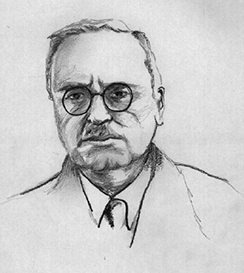| << Chapter < Page | Chapter >> Page > |
Freud attracted many followers who modified his ideas to create new theories about personality. These theorists, referred to as neo-Freudians, generally agreed with Freud that childhood experiences matter, but deemphasized sex, focusing more on the social environment and effects of culture on personality. Four notable neo-Freudians include Alfred Adler, Erik Erikson, Carl Jung (pronounced “Yoong”), and Karen Horney (pronounced “HORN-eye”).
Alfred Adler , a colleague of Freud’s and the first president of the Vienna Psychoanalytical Society (Freud’s inner circle of colleagues), was the first major theorist to break away from Freud ( [link] ). He subsequently founded a school of psychology called individual psychology , which focuses on our drive to compensate for feelings of inferiority. Adler (1937, 1956) proposed the concept of the inferiority complex . An inferiority complex refers to a person’s feelings that they lack worth and don’t measure up to the standards of others or of society. Adler’s ideas about inferiority represent a major difference between his thinking and Freud’s. Freud believed that we are motivated by sexual and aggressive urges, but Adler (1930, 1961) believed that feelings of inferiority in childhood are what drive people to attempt to gain superiority and that this striving is the force behind all of our thoughts, emotions, and behaviors.

Adler also believed in the importance of social connections, seeing childhood development emerging through social development rather than the sexual stages Freud outlined. Adler noted the inter-relatedness of humanity and the need to work together for the betterment of all. He said, “The happiness of mankind lies in working together, in living as if each individual had set himself the task of contributing to the common welfare” (Adler, 1964, p. 255) with the main goal of psychology being “to recognize the equal rights and equality of others” (Adler, 1961, p. 691).
With these ideas, Adler identified three fundamental social tasks that all of us must experience: occupational tasks (careers), societal tasks (friendship), and love tasks (finding an intimate partner for a long-term relationship). Rather than focus on sexual or aggressive motives for behavior as Freud did, Adler focused on social motives. He also emphasized conscious rather than unconscious motivation, since he believed that the three fundamental social tasks are explicitly known and pursued. That is not to say that Adler did not also believe in unconscious processes—he did—but he felt that conscious processes were more important.
One of Adler’s major contributions to personality psychology was the idea that our birth order shapes our personality. He proposed that older siblings, who start out as the focus of their parents’ attention but must share that attention once a new child joins the family, compensate by becoming overachievers. The youngest children, according to Adler, may be spoiled, leaving the middle child with the opportunity to minimize the negative dynamics of the youngest and oldest children. Despite popular attention, research has not conclusively confirmed Adler’s hypotheses about birth order.

Notification Switch
Would you like to follow the 'Psychology' conversation and receive update notifications?